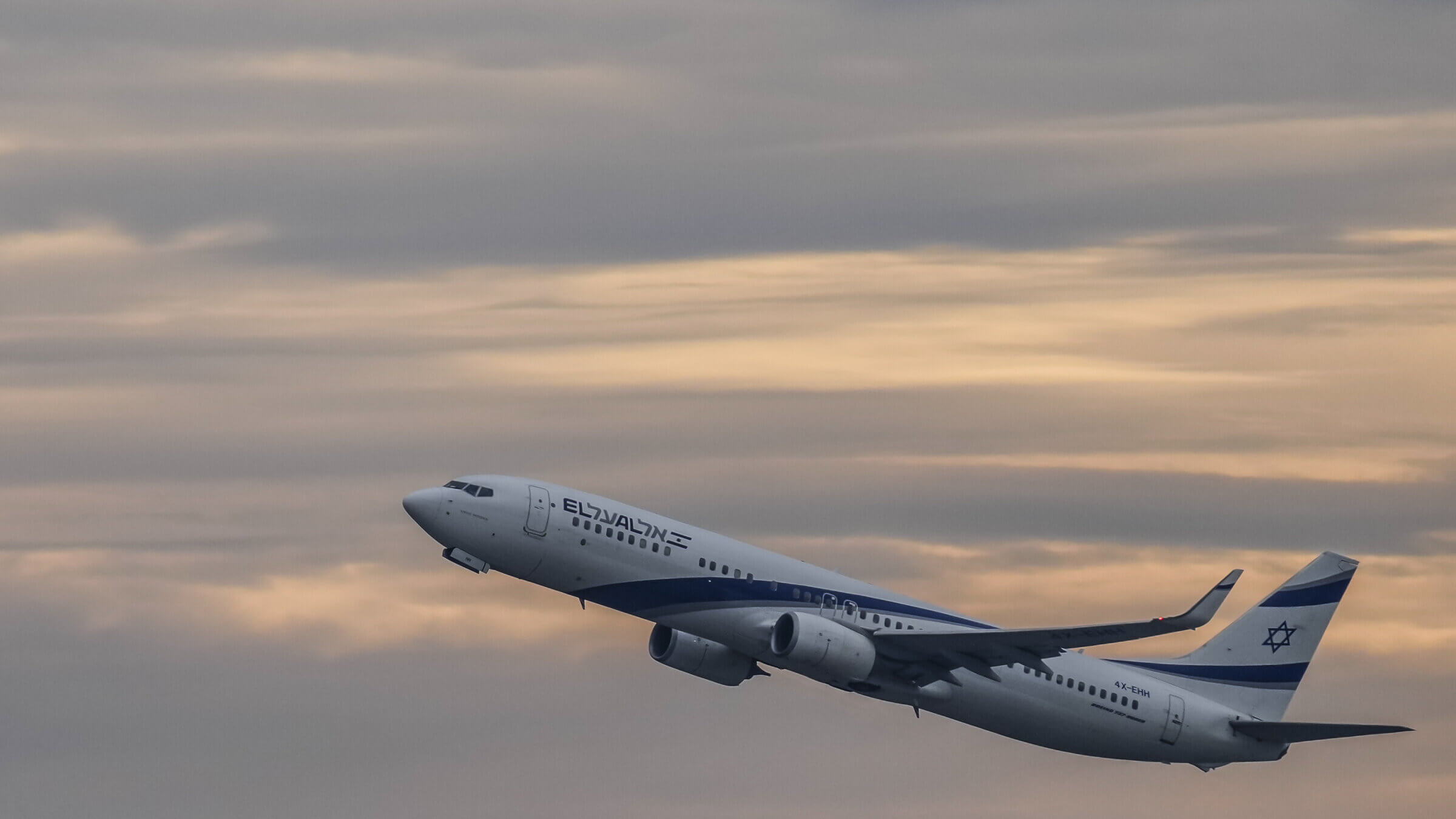How it feels to leave Israel when an attack is coming and every airline is canceling flights
On El Al out of Tel Aviv, some passengers aren’t planning to get anywhere but out

An El Al passenger aircraft takes off. Photo by Getty Images
The poet I am translating was adamant that waiting until Aug. 15 to leave Israel was too big a risk. She didn’t care what my ticket said; she wanted me to change it.
Multiple pundits had forecast that Iran would attack on Tisha B’Av, which starts the evening of Aug. 13 and lasts through the 14th at night. It’s the saddest day on the Jewish calendar and commemorates the destruction of the Temple in Jerusalem; many disasters in Jewish history have happened on that date. Eicha, or the Book of Lamentations, is read on Tisha B’Av, and among its many memorable lines is the awful image of mothers eating their children. “The hands of women full of compassion have sodden their own children; they were their food in the destruction of the daughter of my people,” as the 1918 Jewish Publication Society translation reads.
All through Shabbat, which I spent at her home because her building has a bomb shelter, the poet kept saying that the attack on Israel could start any time.
She wanted me out of Israel, ASAP. She thought I had no idea what a real war was.
With nearly every airline cancelling flights, I clicked through El Al’s website and emailed the travel agent who had arranged my original ticket.
El Al was the only airline still honoring its commitments, but all they could offer me was a flight to Chicago on Aug. 14 for a change fee of $1200. Not good enough.
I looked at flights to New York on El Al. An eye-popping $5200 one way. They’re ganavim, thieves, a lifelong resident of Tel Aviv who does medical massages for a living, wrote when I texted him about it.
I searched frantically for flights to Europe. The first few I looked at stopped in places I didn’t feel safe traveling to right now, like Istanbul, or Baku. I eventually found a direct flight to Paris on El Al with exactly one seat left. I rushed to pay $700, figuring I would find a flight to the US from Europe.
But I felt awful.
I still had family and friends to see, books to buy, a library to visit. But I knew that in the event of a widening war, or the absolute worst scenario, a five-front war, the skies would close and I would not be able to make it in time to teach on the first day of school.
“My ex-husband was stuck in the United States for two and a half months after Oct. 7,” the poet kept repeating. “There were no flights. That’s what can happen.”
I rushed to do a lot of errands in a few quick hours — return a key; do laundry; pack; clean; schedule a cab pickup; then say my goodbyes. And I would have to do it knowing I might not be able to board since war was “imminent,” as various commentators said. Apparently, President Biden thought so, too, or so commentators on radio and television were saying.
On Sunday night, I heard planes flying all night, from 3:00 to 5:00 AM. I knew they weren’t commercial planes. I texted an Israeli friend, a social worker, who has been hearing those sounds for months when she opens her window at night. She told me it was the Israeli air force “It’s us, it’s okay,” she texted.
Is anyone in this country sleeping?

At 9:15 AM sharp, the cab driver told me he had made aliya during the Yom Kippur War from the former Soviet Union; he didn’t speak a word of Hebrew. It had worked out okay, or b’seder, he said, probably the most common word in Israeli Hebrew. Within a year, he met and married his wife, and he did well in business.
He had sold his home, or villa, in the Rishon LeZion area for more than 4 million shekels and purchased an apartment in Tel Aviv to make his wife happy. Now it was worth 7 million; he drove a cab a few hours a week to stay busy. He didn’t want to run his own company anymore.
He told me that since I had a job I needed to show up to, I had done the right thing, but that I would be back, and it would be okay.
Ben Gurion Airport was at about 20% of its usual summer crowds. Forget waiting nearly four hours to check a bag as I had done in previous summers; this line took a breezy 30 minutes.
Almost everyone in line was a religious Jew going back to the United States. The woman in front of me had a son with a Tzivos Hashem kippah, meaning she was likely Lubavitch; the guy in back of me wore the traditional yeshiva boy outfit — black hat, black suit, white shirt. We talked about staying safe while looking very Jewish.
The exception to all this was my flight; at the check-in counters, almost everyone was a French Jew returning to France. A tall, elegant, white-haired man was walking around, desperately asking, in English, “Do you speak French?”
Apparently, the agent he had to deal with spoke only Hebrew and English.
I found myself translating for two families who couldn’t speak either of those languages well enough to deal with a minor crisis.
Personally, I thought the tall man’s elementary Hebrew was fine, and that his halting English was also okay. But after he left, the agent complained to me: “The French are impossible,” he said. “Imagine traveling with only French.”
I didn’t say so, but I thought a French-speaking agent should have been assigned to a flight to France. But these were desperate times. The same agent confidently told me, in Hebrew, that there was no reason to worry and all the El Al flights would take off.
Boarding time came and went with no announcement.
I kept refreshing news sites in two languages to see if there’d been some attack. I bought not one, but two cheese pastries, at the glatt-kosher Tatti café, named after the Yiddish word for daddy, or father. This is what I love about Israel, I thought, all the Jewish languages and resonances are everywhere, even at a coffee shop.
Time passed, still no announcement. I bought a large decaf cappuccino.
Forty minutes after the scheduled flight time, boarding began.
I found myself sitting next to an Israeli who was on his way to Toronto for a month with no plan. “I just had to get out,” he said.
It had been a stressful nine months, and he was exhausted, he said. He asked me if I had ever gone on an adventure like that, to a city where I knew no one, with no agenda. I didn’t know what to say.
I have traveled to investigate the lives of dead writers, most recently a writer who died in 1167, which may be a strange agenda, but it’s still a plan. I usually have some reason to go.

And I think that is what is breaking so many hearts right now — that there are always reasons to travel to Israel, and to stay there, and now Hamas and Hezbollah and the Houthis and, of course Iran — are making all those reasons dependent on their plans. And while many Israelis are doing everything possible to fly home, including the estimated 150,000 stranded abroad right now, there are also exhausted Israelis like my seatmate, whose response to all of this is to travel anywhere with no reason at all.
I thought of what the cabdriver told me: You are doing the only thing you could do right now, but you will be back. And it will be okay.
I didn’t say that, though. Instead, I listened.
All through the El Al flight, I listened to a shiur, or lesson, from the menu of audio programs that the airline provided, about the halacha of mourning. I did not know that from the time of the death of a close relative until the funeral, the mourner was exempt from all the mitzvot aseh, or affirmative commandments, but not from the “don’t do” commandments, such as “thou shalt not steal.”
I found myself listening to various halachic dilemmas this presented; for example, if a mourner is exempt from making a blessing over food, a bracha, well, how did that jibe with the idea that a person who eats without making a blessing is stealing? That’s a violation of “thou shalt not steal.”
I thought of how incredible it was that there was an airline where I could listen to this kind of thing while flying, no matter how much it was charging for my seat.
I was grateful for the break from the news, and felt glad I didn’t pay for WiFi so I could read updates.
I moved on to the Standing Together playlist, all Hebrew songs meant to strengthen those thinking of Israel in this time of crisis. The one that moved me the most was a rendition of the misheberach, the prayer for soldiers, by Eli Levin. I listened again and again to how the prayer melded the geography of Israel with the names of the patriarchs.
I knew that as soon as the plane landed in Paris, I would leave this cocoon where a lesson in Jewish law and a prayer set to song and invoking the patriarchs were options for passengers. I listened to one last song — “Ma’aminim b’nei m’aaminim” by Mordechai ben David.
“We are believers, the children of believers,” he sang.
I guess we are.
At times like this, the believers believe. Those who learn, learn. Those who pray, pray.
Somehow the shiur and the songs and their invocation of belief made me grateful for Israel’s existence, and certain the cab driver with the heavy accent and the wife he loved enough to leave a house for an apartment was right. I would be back.

















